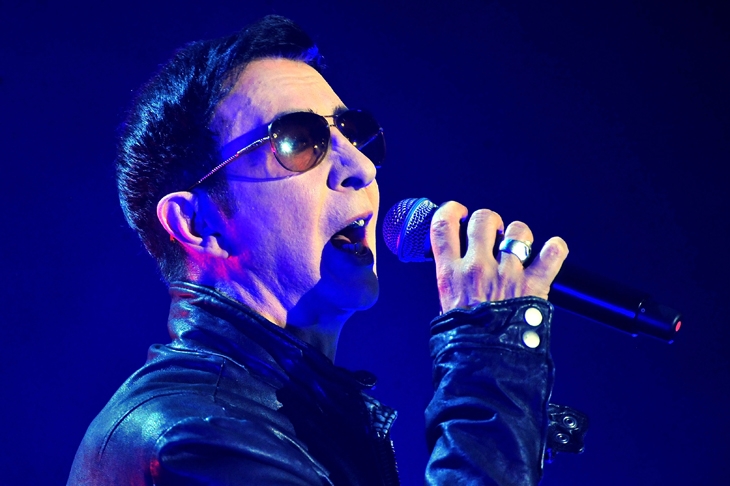When Soft Cell first appeared on Top of the Pops in summer 1981, miming along to their version of Gloria Jones’s ‘Tainted Love’, it felt like a moment of palpable newness. Well, it certainly did if you were prepubescent and really had no idea what sex actually was.
Romantic love — in either its glory or disappointment — was the everyday subject of the pop song, but here was this funny little fella in black, with studded accessories, singing of a love that was ‘tainted’. I had no idea what he got up to when the lights went out. I knew that homosexuality existed — in the same way that California condors existed, and Olympic athletes existed. But as a provincial 12-year-old, I had no idea that Marc Almond was gay, though I was absolutely certain he wasn’t the same as my parents, or my friends’ parents. Almond seemed less an imp of the perverse than of the downright perverted.
Thirty-seven years later, at their third final-ever gig — they have previously played final-ever gigs in 1984 and 2004 — the perversion was, understandably, less evident. Almond has long since graduated from the Sex Dwarf of his own song to national treasure, while keyboard player David Ball is now rotund and bespectacled. The Sunday night audience perhaps has less inclination to dream of dungeons when the working week begins the following morning. And it is hard to imagine a space less suitable for sleazy intimacy than the cavernous O2 Arena.
And what an odd show it was: overlong and under-rehearsed. At one point, Almond apologised for its shambolic nature, and he wasn’t being self-deprecating. Even though it was being beamed to cinemas around Europe and America, it was all a bit wing and a prayer.
Twice Almond called a halt to ‘The Best Way To Kill’ because he missed his vocal cue. He forgot the lyrics of the sublime ‘Where The Heart Is’. He repeatedly upbraided Ball for beginning songs before he’d finished his intros. After an hour and three quarters, when the group exited the stage for a short interlude, Almond’s podium descended through the stage, but didn’t go down low enough. Instead of dramatically disappearing, his head and shoulders remained visible, until he ducked and scurried away. Ball sat and waved cheerily to the audience while waiting for a couple of minutes for Almond’s return as the song ‘Martin’ began, and then stopped. At the show’s climax — ‘Say Hello, Wave Goodbye’, inevitably — it was the turn of Ball’s podium to get stuck on its descent. Everyone always thought This Is Spinal Tap was about heavy-metal bands; maybe there should be a synthpop version.
But there were no boos, probably because — unusually for an arena show —there were almost no neutrals in attendance. Virtually all the 20,000 people present were beaming their goodwill towards the stage, because when the best songs came they were a reminder that Soft Cell were special. If ‘Tainted Love’ had been cold and unyielding, the heart of Soft Cell was warm and soft: their best subject was not human cruelty but human frailty. ‘Where The Heart Is’, ‘Torch’ and ‘Bedsitter’ were sad and beautiful, and testimony to the fact that Ball’s musical settings — often markedly unlike his synthpop peers’, favouring the symphonic over the clipped — were what enabled Almond to be such an emotive presence.
Soft Cell aren’t disappearing. Almond hinted at further recordings, but insisted that this was it as far as performance goes. I doubt it. There was so much wrong with this one that it’s hard to imagine that either Almond or Ball would want it to be anyone’s final memory of them. They waved goodbye; I bet they’ll be saying hello again eventually.






Comments